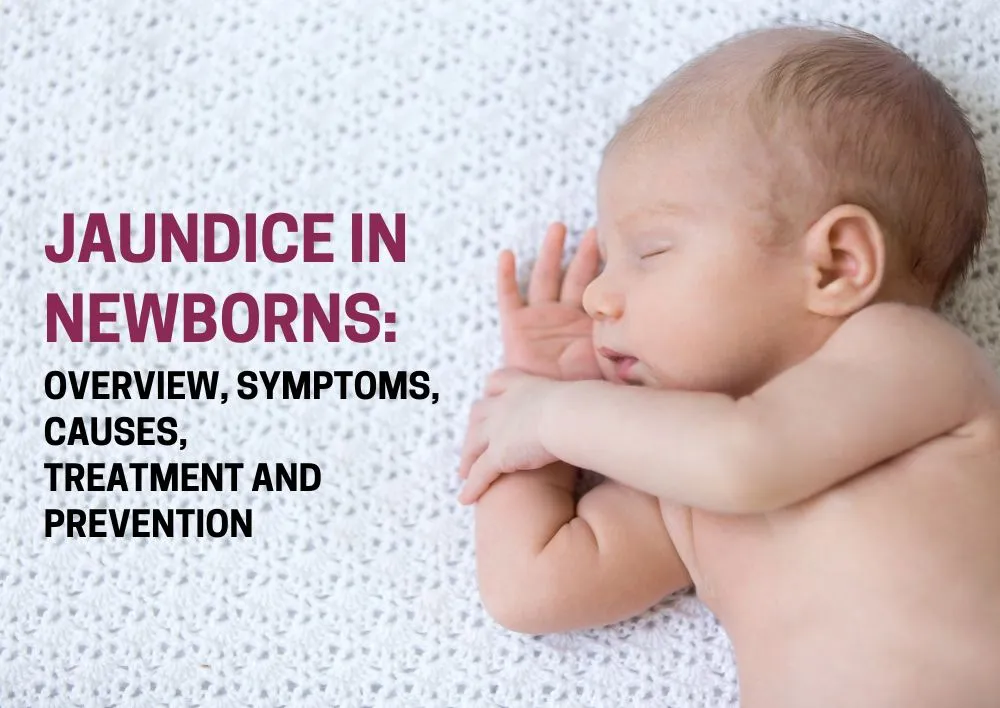Jaundice in Newborns: Overview, Symptoms, Causes, Treatment and Prevention
Jaundice in newborns (Neonatal jaundice) is a very common condition that is indicated by the yellowing of the skin and eyes due to increased levels of bilirubin. While jaundice itself is a manageable condition, it can become a serious threat when left untreated.
Miracles Apollo Cradle, located in Gurgaon, is the best neonatology hospital boasting a team of expert neonatologists and NICU specialists. We are well-equipped with a Level 3 NICU to handle complex neonatal cases, ensuring that infants receive the specialized care they need during this delicate stage of life. Our team of experts is committed to providing the most appropriate and effective treatments tailored to the condition of each patient. If you are looking for the best neonatology specialist for neonatal care near you in Gurgaon, We stand out as a trusted and leading choice.
In this blog post, we will discuss jaundice in newborns, its symptoms, causes, how jaundice can be fatal for a newborn, and the importance of early detection and treatment in detail.
What is Jaundice in Newborns?
Neonatal jaundice usually occurs when there is too much bilirubin in the blood of the baby. Bilirubin is a yellow stain that is produced during the breakdown of red blood cells. In the early days of life, the liver of a newborn may not be fully equipped to process and eliminate bilirubin efficiently, leading to its buildup in the bloodstream.
Mild jaundice is common in newborns, generally appearing within the first few days after birth. In most cases, it resolves on its own without causing harm. However, severe jaundice can cause significant risks to a newborn's health.
Symptoms of Jaundice in Newborns
Here are the common symptoms of neonatal jaundice:
-
Yellowing of the Skin: The most observable symptom of jaundice is the yellowing of the baby's skin. It typically starts on the face and then progresses to other body parts. It is important to check for yellow pigmentation on the baby's chest, abdomen, arms, and legs.
-
Yellowing of the Eyes (scleral icterus): Jaundice can also affect the whites of the baby's eyes, causing them to appear yellow.
-
Yellowing of Mucous Membranes: Apart from the skin and eyes, jaundice may also lead to yellowing of the mucous membranes, such as the gums and inside of the mouth.
-
Changes in Stool Color: Jaundice can affect the color of a newborn's stool. Instead of the usual yellowish color, the stool may appear pale or clay-colored. This change occurs due to the increased levels of bilirubin in the baby's system.
-
Changes in Urine Color: The urine of a jaundiced newborn may become darker than usual because of the excess bilirubin excretion through the urine.
-
Poor Feeding and Lethargy: In some cases, jaundice may cause a baby to become lazy and have difficulties with feeding. This could be due to the underlying effects of high bilirubin levels on the baby's central nervous system.
Causes of Jaundice in Newborns
Here are some causes of neonatal jaundice :
-
Normal Adjustment: It's normal for newborns to have a bit of jaundice because their livers are slow to process bilirubin effectively. This type of jaundice is usually temporary and not a cause for concern.
-
Breast Milk Jaundice: Some babies may develop jaundice due to substances in breast milk that can slow down the withdrawal of bilirubin.
-
Breastfeeding Issues: If a newborn is not feeding well, it can lead to jaundice. Proper feeding helps the baby's body get rid of bilirubin.
-
Blood Type Incompatibility: Sometimes, the type of baby's blood may not match the mother's, leading to an excess of bilirubin in the baby's system.
-
Rh Incompatibility: If the mother and baby have different Rh blood types, it can cause jaundice as the mother's antibodies attack the baby's red blood cells.
-
Infections: Infections can affect the liver's ability to process bilirubin, leading to jaundice, as discussed later.
-
Enzyme Deficiency: A baby with an enzyme deficiency, makes it difficult for their liver to break down bilirubin.
Prevention of jaundice in newborns
Several steps that parents can take to reduce the risk of severe or prolonged jaundice. Here are some preventive measures:
-
Early and Regular Feeding: Ensuring that newborns receive enough breast milk or formula in the first few days of life helps in the proper elimination of bilirubin. Regular feeding encourages bowel movements, which assist in removing excess bilirubin from the body.
-
Monitor Newborn's Weight: Regular weight checks help ensure that the baby is getting enough nourishment. sufficient nutrition is important for the liver to process bilirubin effectively.
-
Keep Well-Hydrated: Ensuring the newborn stays well-hydrated is important. Breast milk or formula provides the necessary fluids for the body to function properly.
-
Monitor Jaundice Levels: Check bilirubin levels in newborns routinely, especially in the first few days after birth. Regular monitoring helps early detection and treatment if bilirubin levels become too high.
-
Promote Skin-to-Skin Contact: Skin-to-skin contact between the baby and parents can help regulate the baby's body temperature and promote bonding. This can also promote breastfeeding, which helps in eliminating the bilirubin.
-
Manage Blood Type Incompatibility: If the mother and baby have different blood types, especially if the mother is Rh-negative but the baby is Rh-positive, the neonatologist may recommend interventions to prevent complications related to jaundice.
-
Manage G6PD Deficiency: Careful management and monitoring are important for babies with a known glucose-6-phosphate dehydrogenase (G6PD) deficiency, which can contribute to jaundice.
-
Regular Check-ups and Follow-ups: Attend all scheduled prenatal and postnatal check-ups to monitor the baby's health and development. Regular follow-ups with neonatologists help address any concerns promptly.
Treatment of Jaundice in Newborns
The treatment of neonatal jaundice depends on the underlying cause and the severity of the condition. In several cases, mild jaundice may be cured without specific treatment. However, when jaundice continues or is more prominent, a neonatologist may recommend various interventions to lower bilirubin levels and prevent complications.
Here are common treatments for jaundice in newborns:
-
Phototherapy: It involves exposing the skin of a baby to special lights that help break down bilirubin into a form that the body can eliminate more easily. For this procedure, NICU experts place the baby under a phototherapy light for a day or several days, with only a diaper on, to allow as much skin exposure as possible until bilirubin levels decrease.
-
Biliblanket: Similar to phototherapy, a biliblanket is a portable device that emits light. It allows the baby to receive phototherapy while lying on a blanket.
-
Exchange Transfusion: In severe cases of jaundice, especially when bilirubin levels are dangerously high or when other treatments are not effective. A small amount of the baby's blood is replaced with donor blood to help rapidly decrease bilirubin levels.
-
Intravenous (IV) Immunoglobulin: In case of jaundice caused by blood type or Rh incompatibility, IV immunoglobulin may be given to reduce the breakdown of red blood cells. It helps prevent the immune system from attacking the baby's red blood cells.
-
Management of Underlying Causes: If jaundice is caused by an infection, appropriate antibiotics or antiviral medications may be administered.
-
Addressing blood type issues: In cases of Rh or blood type incompatibility, managing these issues early on can help prevent further complications.
Conclusion:
While jaundice is common in newborns, it is important to understand the potential risks it causes when left untreated. Early detection and intervention can make all the difference, preventing the harmful consequences that severe jaundice can have on a newborn's health and development.
Miracles Healthcare is the best neonatology hospital in Gurgaon that offers treatment for neonatal jaundice. We ensure the neonates get holistic medical support to help patients heal better. The hospital offers comprehensive healthcare services through multiple facilities: Miracles Apollo Cradle, Miracles Apollo Cradle/Spectra, Miracles Fertility & IVF Clinic, and Miracles Mediclinic, which are located in Sec 14, Sec 56, and Sec 82, making daily healthcare more convenient for the people of Gurgaon.
In case you notice any symptoms of newborn jaundice in your infant, it's important to consult a neonatology doctor near you immediately.














Was the information useful?
4 0